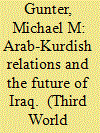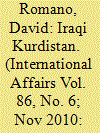| Srl | Item |
| 1 |
ID:
108100


|
|
|
|
|
| Publication |
2011.
|
| Summary/Abstract |
The Iraqi Kurds now not only possess their most powerful regional government since the creation of Iraq following World War I (the Kurdistan Regional Government-krg), but also play a prominent role in the Iraqi government in Baghdad, holding the posts of president, foreign minister and several other cabinet positions. After a great deal of wrangling, the Kurds managed to maintain their strong position in al-Maliki's new Baghdad government finally cobbled together in December 2010. This dual governmental role stood in marked contrast to the situation that existed before the events of 1991 and 2003, when the Kurds were treated as second class citizens and worse. The ultimate question is for how long this unique Kurdish position of strength will last. Many Arabs still resent the Kurdish claims to autonomy as a challenge to the Arab patrimony and see a federal state for the Iraqi Kurds within Iraq as simply a prelude to secession forced upon the Arabs at a moment of temporary weakness following the war in 2003. When will the Iraqi Arabs organise themselves and start trying to reduce the power of the Kurds again? This paper will analyse this developing situation and tentatively conclude that the two sides are most likely to continue to coexist in a troublesome but peaceful relationship.
|
|
|
|
|
|
|
|
|
|
|
|
|
|
|
|
| 2 |
ID:
099903


|
|
|
|
|
| Publication |
2010.
|
| Summary/Abstract |
In August 2010, the United States officially ended the combat mission of its military forces in Iraq and withdrew all but 50,000 of its troops from the country. Iraqi Kurds now contemplate the implications of the looming withdrawal of the remaining 50,000, scheduled for the end of 2011. While Arab-Kurdish relations in Iraq face the risk of serious deterioration, the US military withdrawal will probably not greatly affect the internal politics of Kurdistan. Given the de facto autonomy the region has enjoyed since 1991 and the Kurds' resulting experience with self-rule, Iraqi Kurdistan never suffered from the post-2003 security and political vacuums plaguing the rest of the country. As a result, no more than a few hundred coalition troops were stationed in Iraqi Kurdistan (and no coalition casualties have occurred there since 2003), with governance and security remaining completely in the hands of the Kurdish authorities.
While important centrifugal tendencies do exist in Iraqi Kurdistan and are discussed here, the region will most likely continue to deal with Baghdad and the rest of the outside world with the united voice it cultivated after 2003. US civilian personnel and advisers will also remain in Iraq after the military withdraws, which offers the possibility of assisting Iraqi Kurdistan to overcome obstacles in order to achieve better, more transparent governance. A continuing American diplomatic engagement in Iraq also offers the possibility of helping Kurdistan further institutionalize its autonomy vis-à-vis Baghdad and neighbouring states.
|
|
|
|
|
|
|
|
|
|
|
|
|
|
|
|